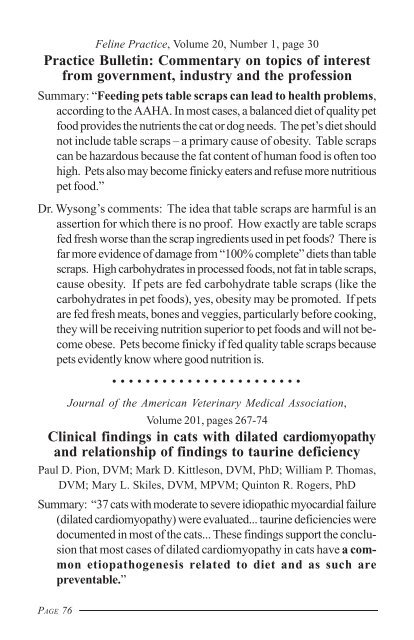The-Truth-About-Pet-Foods
The-Truth-About-Pet-Foods
The-Truth-About-Pet-Foods
Create successful ePaper yourself
Turn your PDF publications into a flip-book with our unique Google optimized e-Paper software.
Feline Practice, Volume 20, Number 1, page 30<br />
Practice Bulletin: Commentary on topics of interest<br />
from government, industry and the profession<br />
Summary: “Feeding pets table scraps can lead to health problems,<br />
according to the AAHA. In most cases, a balanced diet of quality pet<br />
food provides the nutrients the cat or dog needs. <strong>The</strong> pet’s diet should<br />
not include table scraps – a primary cause of obesity. Table scraps<br />
can be hazardous because the fat content of human food is often too<br />
high. <strong>Pet</strong>s also may become finicky eaters and refuse more nutritious<br />
pet food.”<br />
Dr. Wysong’s comments: <strong>The</strong> idea that table scraps are harmful is an<br />
assertion for which there is no proof. How exactly are table scraps<br />
fed fresh worse than the scrap ingredients used in pet foods <strong>The</strong>re is<br />
far more evidence of damage from “100% complete” diets than table<br />
scraps. High carbohydrates in processed foods, not fat in table scraps,<br />
cause obesity. If pets are fed carbohydrate table scraps (like the<br />
carbohydrates in pet foods), yes, obesity may be promoted. If pets<br />
are fed fresh meats, bones and veggies, particularly before cooking,<br />
they will be receiving nutrition superior to pet foods and will not become<br />
obese. <strong>Pet</strong>s become finicky if fed quality table scraps because<br />
pets evidently know where good nutrition is.<br />
○ ○ ○ ○ ○ ○ ○ ○ ○ ○ ○ ○ ○ ○ ○ ○ ○ ○ ○ ○ ○ ○ ○<br />
Journal of the American Veterinary Medical Association,<br />
Volume 201, pages 267-74<br />
Clinical findings in cats with dilated cardiomyopathy<br />
and relationship of findings to taurine deficiency<br />
Paul D. Pion, DVM; Mark D. Kittleson, DVM, PhD; William P. Thomas,<br />
DVM; Mary L. Skiles, DVM, MPVM; Quinton R. Rogers, PhD<br />
Summary: “37 cats with moderate to severe idiopathic myocardial failure<br />
(dilated cardiomyopathy) were evaluated... taurine deficiencies were<br />
documented in most of the cats... <strong>The</strong>se findings support the conclusion<br />
that most cases of dilated cardiomyopathy in cats have a common<br />
etiopathogenesis related to diet and as such are<br />
preventable.”<br />
PAGE 76


